|
Sunday Sailings to Lewis
A way of life which has been preserved in the face of 24/7 trends is under threat (again); it is a typical battle of tradition and culture and religious views coming up against the pressures of the 21st-century world.
Preamble:
Major-General Douglas Wimberley, Colonel of the Queen's Own Cameron Highlanders, commanded the famous 51st Highland Division from 1941 to 1943.
Speaking as Chairman of the Annual Piping Competition of the Uist and Barra Association on February 16, 1957, General Wimberley, in a reference to the establishment of the guided missile range in the Uist Islands, said that:
these Islands were the acknowledged last stronghold of all that was best in Gaelic culture, and it would require all the Islanders' resolution to hold on very lightly to their culture, their Gaelic, their Highland ways and their ceilidhs in the days that lay ahead.
(What follows has been written for an audience which is much wider than the North-West Scotland.)
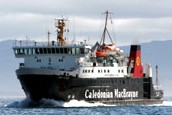 A FIERCE BATTLE for and against Sunday sailings presently being fought on the Hebrides (see map at foot of this article) is reminiscent of a similar campaign many years ago over ferry links between the Scottish mainland and the Isle of Skye. At that time a certain West Highland clergyman was dubbed ‘The Ferry Reverend’ by the media when he reportedly lay down on a slipway in an attempt to prevent Sunday ferry sailings between (mainland) Kyle and Klyeakin on the south end of Skye. The minister’s best efforts proved unsuccessful, and were ultimately and completely subverted by the building of the Skye Bridge which now crosses the water on which the ferries once sailed. (The main matter of contention following the construction of the road crossing centred on a subsequent campaign for the – eventually successful – removal of the toll charges which were initially imposed.) A FIERCE BATTLE for and against Sunday sailings presently being fought on the Hebrides (see map at foot of this article) is reminiscent of a similar campaign many years ago over ferry links between the Scottish mainland and the Isle of Skye. At that time a certain West Highland clergyman was dubbed ‘The Ferry Reverend’ by the media when he reportedly lay down on a slipway in an attempt to prevent Sunday ferry sailings between (mainland) Kyle and Klyeakin on the south end of Skye. The minister’s best efforts proved unsuccessful, and were ultimately and completely subverted by the building of the Skye Bridge which now crosses the water on which the ferries once sailed. (The main matter of contention following the construction of the road crossing centred on a subsequent campaign for the – eventually successful – removal of the toll charges which were initially imposed.)
Now a similar controversy has broken out over proposals by main ferry operator Caledonian MacBrayne (CalMac) to introduce a 7-day service to Stornoway (the island capital). And this move is a response – the operator states – to both public demand and commercial and economic imperatives. However ‘public demand’ is very much divided over the issue as a very substantial proportion of the Western Isles population is strongly and vociferously opposed – on theological and/or sociological grounds – to such a prospect. ‘We appreciate our way of life and a bit of peace and quiet one day in seven.’
Most recently the dispute has prompted the resignation of a senior Western-Isles councillor who strongly supports Sunday sailings. Donald John Macsween has quit his post as vice-chairman of transportation as he could not support his Council's (Comhairle nan Eilean Siar) policy opposing seven-day sailings. (Macsween intends to stand for the Labour party at the next general election against the incumbent Scottish National Party MP Angus MacNeil. The Member of the Scottish Parliament for the area is Alasdair Allan.)
Demography
For those who might be unfamiliar with the north-west of Scotland, the Hebrides is a chain of islands lying around 30 miles off the mainland coast; the archipelago extends over a distance of around 120 miles in roughly a NE/SW direction. The islands are separated from the mainland by a (sometimes fierce) stretch of water called ‘the Minch’. In a westward direction the next stop is North America. Stornoway on the Isle of Lewis is by far the biggest settlement with a population of around 6000 people - representing around 30% of the total population; the remainder of the total of around 26,000 are scattered throughout over 280 townships and settlements. On large tracts of land there can be more sheep than people. Stornoway is the only population centre that could be described as ‘urban’. The capital is the main shipping port and airport. (Smaller harbours and airports serve the other islands and range, respectivelhy, from substantial car-ferry terminals to slipways for small boats; and from runways for larger aircraft to a beach which serves as a landing spot at low tide.)
Topography and lifestyle
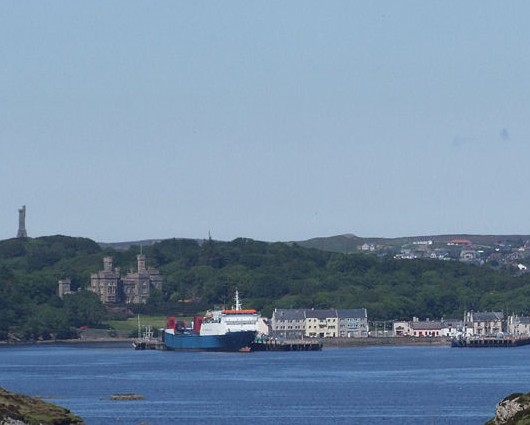 The Hebridean features can change dramatically – and over very short distances – from soaring and majestic mountains to tree-less and barren marshlands and peat bogs. There are beautiful sandy beaches within short distances of inhospitable and rocky moonscapes. A rugged coastline exposed to a mighty Atlantic storm can – with rapidly-changing weather – be transformed within hours to a calm and beautiful serenity which soothes the soul. Modern life in Stornoway dissolves into remote settings which have a changed little over hundreds of years. Modern bungalows sit alongside the ruined croft houses of earlier generations; and the pressing calls of the modern workaday world take second place to the seasonal demands of lambing and shearing and peat-cutting and fishing and crofting (a croft is much more than an allotment but less than a farm). Ceilidh’s (informal parties and social gatherings) can be found in local hotels, village halls and in homes. And work (and leisure) patterns are conditioned more by season, weather, tide, caring for sheep and church and pub opening times than by the position of the hands of the clock. The Hebridean features can change dramatically – and over very short distances – from soaring and majestic mountains to tree-less and barren marshlands and peat bogs. There are beautiful sandy beaches within short distances of inhospitable and rocky moonscapes. A rugged coastline exposed to a mighty Atlantic storm can – with rapidly-changing weather – be transformed within hours to a calm and beautiful serenity which soothes the soul. Modern life in Stornoway dissolves into remote settings which have a changed little over hundreds of years. Modern bungalows sit alongside the ruined croft houses of earlier generations; and the pressing calls of the modern workaday world take second place to the seasonal demands of lambing and shearing and peat-cutting and fishing and crofting (a croft is much more than an allotment but less than a farm). Ceilidh’s (informal parties and social gatherings) can be found in local hotels, village halls and in homes. And work (and leisure) patterns are conditioned more by season, weather, tide, caring for sheep and church and pub opening times than by the position of the hands of the clock.
Cultural, social and ideological affiliations
Many years ago a young man from the East coast headed for a spell of detached duty working in a west-coast township. The advice he was given was that he would have to decide on whether to become a member of the church or the pub. Religion or alcohol was the choice on offer and by and large this socio-religious demarcation line serves as a convenient shibboleth which runs like a fault-line through the communities. Although it serves as a very significant divide it is countered by the effects of geography, climate, culture and the widely-spoken Gaelic language which enforce a shared set of values within the social milieu. Peat (fossil-fuel) which require to be ‘cut’ (dug out) and sheep that need to be lambed and sheared do not pay too much attention to which day of the week it is or whether or not the crofter spends his discretionary time in a place of worship or the local hostelry.
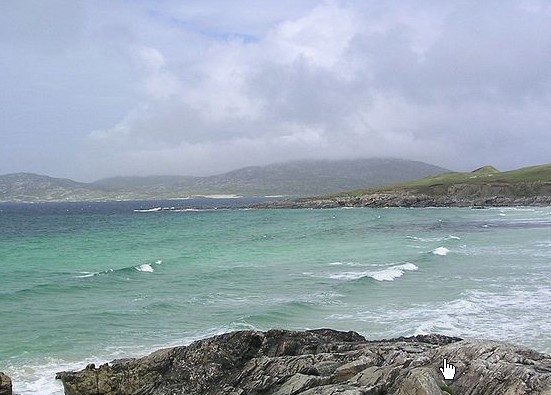 Paradoxically (and this anecdote captures some of the love/hate relationship that many have with one of Scotland’s principal exports) a senior Reformed minister from the mainland was once invited to officiate at an island church sacrament being conducted by an ultra-conservative denomination. (These periodic ‘communion seasons’ are held in extremely high regard and last for 3-4 days.) When shown into the guest bedroom in the manse/residence of the host minister, the visiting clergyman was interested (certainly) and surprised (probably), but not shocked (necessarily) to be greeted by a full bottle of whisky and crystal glass adorning the bedside table. After all….he was in the Western Isles. Nowadays ‘en-suite’ refers mainly to washing facilities rather then the ready availability of a ‘nightcap’ (a late-evening libation). Paradoxically (and this anecdote captures some of the love/hate relationship that many have with one of Scotland’s principal exports) a senior Reformed minister from the mainland was once invited to officiate at an island church sacrament being conducted by an ultra-conservative denomination. (These periodic ‘communion seasons’ are held in extremely high regard and last for 3-4 days.) When shown into the guest bedroom in the manse/residence of the host minister, the visiting clergyman was interested (certainly) and surprised (probably), but not shocked (necessarily) to be greeted by a full bottle of whisky and crystal glass adorning the bedside table. After all….he was in the Western Isles. Nowadays ‘en-suite’ refers mainly to washing facilities rather then the ready availability of a ‘nightcap’ (a late-evening libation).
Religious diversity
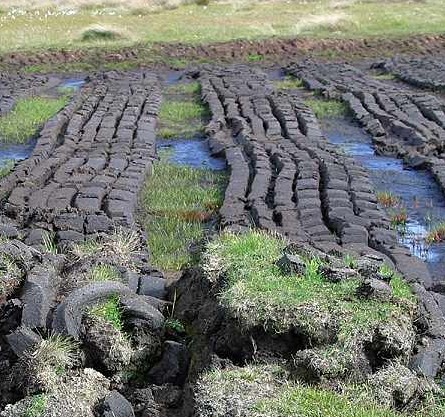 There is a quite remarkable divergence of religious affiliation across the string of islands. The north is staunchly Protestant whereas there is a marked crossover half way down the chain whereby the southern-most parts are strongly Roman Catholic. In the north, a clergyman would be de-frocked for playing football (or any other sport) on a Sunday whereas in the (Catholic) south the priest might be seen as letting the side down if he didn’t support the local team on a Sunday contest. (It is rare, paradoxical and quixotic even to evidence two adjacent and very religious communities so amicably spanning the Reformation divide which otherwise tore whole continents apart.) The reformed and conservative north have apparently long-forgiven the (rather more free-wheeling) Catholic south for assisting Catholic ‘Pretender’ Bonnie Prince Charlie’s escape from the British Isles There is a quite remarkable divergence of religious affiliation across the string of islands. The north is staunchly Protestant whereas there is a marked crossover half way down the chain whereby the southern-most parts are strongly Roman Catholic. In the north, a clergyman would be de-frocked for playing football (or any other sport) on a Sunday whereas in the (Catholic) south the priest might be seen as letting the side down if he didn’t support the local team on a Sunday contest. (It is rare, paradoxical and quixotic even to evidence two adjacent and very religious communities so amicably spanning the Reformation divide which otherwise tore whole continents apart.) The reformed and conservative north have apparently long-forgiven the (rather more free-wheeling) Catholic south for assisting Catholic ‘Pretender’ Bonnie Prince Charlie’s escape from the British Isles
Sociology
Regarding external influences on the Hebridean way of life these have increased dramatically over the latter half of the 20th century. Until well after the 2nd World War, the Hebrides – because of the geographic isolation, inclement weather, and poor and often-unreliable transport links (everything had to come in by sea or air) the communities were fairly isolated regarding national trends, traits and fashions which flooded into Western societies in the 60s/70s. If mini-skirts (remember them?) ever did reach the Hebridean shops, the strict codes of modesty (and chastity) would have required a considerable degree of courage on the part of any mini-skirt wearer to appear in a public (or even in private) in scanty apparel. Even in the latter part of the 20th century the relative isolation and the intimacy of small communities meant that drugs took that bit longer to arrive in any significant quantities. And the local grapevine would quickly identify any ‘user’.
Whisky and Rockets Galore
As an interesting ‘aside’ the Hebrides were the settings for two well-known screen productions in the post-war years; and this has been augmented by a more recent film about rocket technology
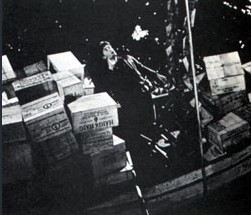 The film ‘Whisky Galore’ captured a war-time incident when the lack of the alcoholic spirit was remedied by a freighter, bound for America, but sinking with its cargo of Uisge Beatha (Water of Life) just off one off the small island of Eriskay. The locals (island residents) got to the precious cargo before the men from the Customs an Excise, and considerable ingenuity was brought to bear to conceal the salvaged liquor from the plundered wreck from His Majesty’s officers. The film ‘Whisky Galore’ captured a war-time incident when the lack of the alcoholic spirit was remedied by a freighter, bound for America, but sinking with its cargo of Uisge Beatha (Water of Life) just off one off the small island of Eriskay. The locals (island residents) got to the precious cargo before the men from the Customs an Excise, and considerable ingenuity was brought to bear to conceal the salvaged liquor from the plundered wreck from His Majesty’s officers.
 However even earlier in the years prior to WW2 a German rocket scientist conducted an experiment on the Isle of Scarp (off Harris) in an attempt to send mail by rocket. Gerhard Zucher’s efforts failed and he was ‘re-patriated’ to East Germany when the war broke out, but the episode was captured in a film Rocket Post (released 2006) which carried great shots of the coastal scenery around Harris. However even earlier in the years prior to WW2 a German rocket scientist conducted an experiment on the Isle of Scarp (off Harris) in an attempt to send mail by rocket. Gerhard Zucher’s efforts failed and he was ‘re-patriated’ to East Germany when the war broke out, but the episode was captured in a film Rocket Post (released 2006) which carried great shots of the coastal scenery around Harris.
Later, as the development of rocket technology was trialled in the 60s an army base was built on one of the main islands in the southern group to house the Royal Artillery personnel who test-fired their anti-aircraft munitions into the watery Atlantic wastes – secure in the knowledge that the casualties of any explosive mishap would be confined to that of a local rabbit or seagull.) However, the future of the missile-testing programme on the Uists is currently under threat; and the loss of jobs would be significant if the army withdraws.
To quote the Bob Dylan lyric: ‘The times they are a-changing’.
In terms of the population, easier access and modern facilities have attracted ‘incomers’ to take up residence in the Hebrides. And those who have come from other parts can be both unaware and unconcerned about local customs, and what is and isn’t allowable behaviour. So with the rest of the world moving towards a 24/7 society and life-style the pressures to renounce Sunday prohibitions have increased. And given that a substantial section of the indigenous population want to be able to shop and play sport on Sundays so we find a significant movement for change.
Added to all of this there are factors relating to livelihood and income generation. Given that a significant slice of the fragile economy depends on tourism, there is a strong economic case (some argue) to cater for those holiday visitors who are more concerned to have easy access to shops and public transport every day of the week than they are to conform to local traditions.
A Big Domino – and everyone knows it
 The situation is a ‘big domino’ for a way of life that has fought to preserve the traditions of centuries. What is a stake is a whole way of life. And with all such weighty matters the politicians are brought into the fray. The situation is a ‘big domino’ for a way of life that has fought to preserve the traditions of centuries. What is a stake is a whole way of life. And with all such weighty matters the politicians are brought into the fray.
Whilst the politicians (Scottish and Westminster) who represent the islanders have been and continue to be pressed for their respective views, these men are obviously very aware of the spread and depth of division amongst their supporters, and continue to be extremely reticent in their publicly-expressed views. This ambivalence demonstrated by the incumbent party-politicians has – in the context of the above dispute – prompted, or at least strengthened the call for a future political candidate to stand as an independent at the next (UK) general election.
The Hebrides, in contrast to the Highland mainland, has historically been ‘party political’ rather than independent and non-aligned. However the advantage of having the backing of one mainstream party or another has never been divorced from the status of the local candidate(s). In recent history the vote – in party terms – has swung between Labour and Scottish Nationalist. (These parties respectively reflect the general ‘socialist-but-separate’ component of the islands’ corporate identity.)
At the last Scottish elections (in 2007 and for the Scottish Parliament) the fledgling Scottish Christian Party fielded a popular and respected candidate for the Highlands and Islands constituency (which included the Hebrides).
A local Christian in the process...
 Murdo Murray is a former Technical Director for the Hebridean local authority and lives and works on the islands. He is a committed Christian and would, in this regard, be expected to fight to ‘keep Sunday special’ (as a UK-wide campaign became known). Needless to say anyone standing on this ticket would have the strongest support from the very active Lord’s Day Observance Society. Murdo Murray is a former Technical Director for the Hebridean local authority and lives and works on the islands. He is a committed Christian and would, in this regard, be expected to fight to ‘keep Sunday special’ (as a UK-wide campaign became known). Needless to say anyone standing on this ticket would have the strongest support from the very active Lord’s Day Observance Society.
In speaking to Christians Together, Murray observed that the supporters of Sunday sailings are using the ‘human rights’ arguments which in turn have been taken up by the ferry company in support of the case. He asks: 'Why the clamour for 7-day sailings from Lewis when the elected representatives in the local authority have been asking for a late Saturday-night sailing which has never been granted.'The company should be more responsive to issues that are raised by elected representatives rather than raising issues that are creating division.'
Working now as a private consultant, the Lewisman outlined some important points from socio-political and economic perspectives which tend to undermine the ferry company's case.
But illustrating that he is not entrenched in his views he pointed out that whilst serving with the Council, he was responsible for implementing the transport policy which introduced Sunday sailings to the Uists (which make up the southern half of the string of islands). When asked how the churches responded on that occasion Murray responded: ‘I don’t think the LDOS were too perturbed about it because that was what the community wanted.’ And ‘mercy’ sailings on humanitarian or medical grounds have always been permitted throughout.
Over the years Murray has himself pressed CalMac to introduce later Saturday-evening sailings which would allow returning islanders longer on the mainland to participate in family gatherings and social or sporting events. However Murray feels that the publicly-owned transport company has resisted these calls as to respond would have weakened the organisation’s case for Sunday sailings.
Although CalMac are endeavouring to support their intentions using 'human rights' legislation, the LDOS have also taken legal advice which rejects the company's claim.
The debate continues…..feel free to join in
<Top of page>
|
Christians Together, 16/06/2009
|
|
|
|